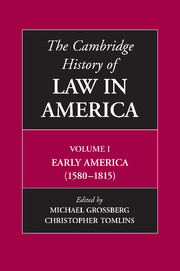Book contents
- Frontmatter
- 1 Law, Colonization, Legitimation, and the European Background
- 2 The Law of Native Americans, to 1815
- 3 English Settlement and Local Governance
- 4 Legal Communications and Imperial Governance: British North America and Spanish America Compared
- 5 Regionalism in Early American Law
- 6 Penality and the Colonial Project: Crime, Punishment, and the Regulation of Morals in Early America
- 7 Law, Population, Labor
- 8 The Fragmented Laws of Slavery in the Colonial and Revolutionary Eras
- 9 The Transformation of Domestic Law
- 10 Law and Religion in Colonial America
- 11 The Transformation of Law and Economy in Early America
- 12 Law and Commerce, 1580–1815
- 13 Law and the Origins of the American Revolution
- 14 Confederation and Constitution
- 15 The Consolidation of the Early Federal System, 1791–1812
- 16 Magistrates, Common Law Lawyers, Legislators: The Three Legal Systems of British America
- Bibliographic Essays
- Notes on Contributors
- Index
- References
12 - Law and Commerce, 1580–1815
Published online by Cambridge University Press: 28 November 2008
- Frontmatter
- 1 Law, Colonization, Legitimation, and the European Background
- 2 The Law of Native Americans, to 1815
- 3 English Settlement and Local Governance
- 4 Legal Communications and Imperial Governance: British North America and Spanish America Compared
- 5 Regionalism in Early American Law
- 6 Penality and the Colonial Project: Crime, Punishment, and the Regulation of Morals in Early America
- 7 Law, Population, Labor
- 8 The Fragmented Laws of Slavery in the Colonial and Revolutionary Eras
- 9 The Transformation of Domestic Law
- 10 Law and Religion in Colonial America
- 11 The Transformation of Law and Economy in Early America
- 12 Law and Commerce, 1580–1815
- 13 Law and the Origins of the American Revolution
- 14 Confederation and Constitution
- 15 The Consolidation of the Early Federal System, 1791–1812
- 16 Magistrates, Common Law Lawyers, Legislators: The Three Legal Systems of British America
- Bibliographic Essays
- Notes on Contributors
- Index
- References
Summary
Was empire-building an animating objective of the U.S. government in its early years? Was the Constitution enacted to achieve mercantilist purposes? Were early federal government policies mercantilist? In the early twenty-first century, scholars have been answering these questions with a resounding “yes.” Their answers suggest that American colonialism of the late nineteenth century and the record of U.S. military interventions abroad since then are a continuation of values held since the founding.
The scholarship contending that the federal government in the Founding Era was by nature mercantilist (or “neo-mercantilist”) and imperial, however, is imprecise and anecdotal. Moreover, it raises complex historical questions that scholars have not addressed. Why would a nation of colonies that fought a revolution against an imperial power immediately adopt the core values of the mercantilist government it had rejected? How “radical” could the Revolution have been if the framers of the U.S. Constitution viewed empire-building as a primary objective? More broadly, if that were indeed the objective, why did the United States avoid the European race for colonies in Africa, Asia, and the Middle East for most of the nineteenth century?
Here, I provide a detailed history of British mercantilism and explain why its core principles were rejected by American political leaders in the Founding Era. Part I follows Adam Smith’s Wealth of Nations in defining “mercantilism” as the policies in force during British imperial history in the seventeenth and eighteenth centuries. According to this definition, mercantilism comprises several interrelated positions: first, a commitment to the belief that political power and national strength are achieved by government regulations that improve the home country’s balance of trade;
- Type
- Chapter
- Information
- The Cambridge History of Law in America , pp. 400 - 446Publisher: Cambridge University PressPrint publication year: 2008
References
- 2
- Cited by



